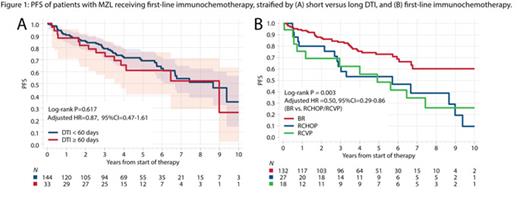Introduction
Diagnosis to treatment interval (DTI) is an important prognostic factor in patients with newly diagnosed diffuse large B-cell lymphoma (Maurer M et al, JCO 2018) and mantle cell lymphoma (Epperla N et al, Blood Adv 2023) where patients with shorter DTI consistently show inferior survival. In marginal zone lymphoma (MZL), the use of first-line bendamustine and rituximab (BR) therapy may enhance progression-free survival (PFS) compared to cyclophosphamide-based regimens such as RCHOP/RCVP. However, the differences in outcomes may be influenced by other factors, such as the DTI, especially in observational studies. Until now, the prognostic significance of DTI in MZL has not been explored. Therefore, our objective was to assess the impact of DTI on outcomes for patients with newly diagnosed MZL.
Methods
This is a substudy of a previously reported multicenter, retrospective cohort that included adult MZL patients treated at 10 US medical centers on or after 1/1/2010. In this substudy, we included patients who initiated first-line BR, RCHOP, or RCVP within 120 days of diagnosis. Patients who were on observation or received antibiotics, local therapy (surgery or radiation therapy), or rituximab monotherapy were excluded. DTI was defined as the number of days from the MZL diagnosis to the start of immunochemotherapy (IC). Using concordance statistics for different DTI cutoffs, we determined 60 days as optimal for analysis. Patients who received treatment within 60 days from their diagnosis were classified into the short DTI group. To compare clinical characteristics between the two groups, univariable and multivariable (MV) logistic regression analyses were performed, accounting for missing data through multiple imputations. The primary endpoint of this analysis was PFS, while secondary endpoints included overall survival (OS) and the cumulative incidence of histologic transformation (HT). Predictors of PFS and OS were identified using Cox regression analysis.
Results
Of the 900 patients with newly diagnosed MZL included in the main study, 177 patients met the inclusion criteria and were included in this analysis, including 144 (81%) in the short DTI group and 33 (19%) in the long DTI group. The median time to treatment initiation was 27 days (range: 1-60) for the short DTI group and 81 days (range: 61-112) for the long DTI group. The median age was 61 years with 43% EMZL (n=77), 38% NMZL (67), and 19% SMZL (33) patients. Among the patients, 75% received BR as first-line treatment followed by R-CHOP (15%), and R-CVP (10%). A higher proportion of patients in the short DTI group had B symptoms compared to long DTI group (27% vs 3%, p=0.03, respectively). No significant differences were observed between the two groups in regard to MZL subtype, ECOG performance status, stage, LDH, or the choice of first-line IC. In the MV model, presence of B symptoms remained significantly associated with short DTI (OR=12.63, p=0.02).
Short DTI was not associated with a statistically different PFS in a univariable assessment (HR=0.86, 95%CI=0.47-1.56), or in the MV model, adjusting for other prognostic factors (aHR=0.87, 95%CI=0.47-1.61, p=0.65, Figure 1A), while high LDH (aHR=2.07, 95%CI=1.06-4.07, p=0.034) and low albumin (aHR=2.31, 95%CI=1.10-4.85, p=0.027) at diagnosis were associated with significantly inferior PFS in the MV model. Additionally, the MV model indicated that patients who received BR had significantly better PFS compared to those who received R-CHOP/RCVP (aHR=0.50, 95% CI=0.29-0.86, p=0.01, Figure 1B).
Short DTI was not associated with inferior OS in either univariable or MV models (MV: aHR=0.74, 95%CI=0.26-2.08, p=0.57). There were 12 transformation events in the study: 8 in the short DTI group and 4 in the long DTI group. The cumulative incidence of HT was not significantly different between the two groups (10-year CIF 13% versus 12%, respectively, p=0.22).
Conclusion
In MZL, a short DTI does not correlate with an inferior prognosis, despite being associated with certain unfavorable characteristics such as the presence of B symptoms. This lack of prognostic utility of DTI in newly diagnosed MZL, in contrast to aggressive B-cell lymphomas, may be intrinsically linked to the underlying biology of the disease. Furthermore, the observed improvement in PFS with BR compared to RCHOP/RCVP, as demonstrated in clinical trials like STiL and BRIGHT, cannot be attributed to differences in DTI.
Disclosures
Epperla:ADC Therapeutics: Consultancy, Honoraria, Membership on an entity's Board of Directors or advisory committees; Merck: Consultancy, Honoraria, Membership on an entity's Board of Directors or advisory committees; Novartis: Consultancy, Honoraria, Membership on an entity's Board of Directors or advisory committees, Speakers Bureau; Incyte: Speakers Bureau; Beigene: Research Funding, Speakers Bureau; Lilly: Consultancy, Honoraria, Membership on an entity's Board of Directors or advisory committees. Shouse:Beigene, Inc.: Speakers Bureau; Kite Pharmaceuticals: Consultancy, Speakers Bureau. Grover:Sangamo: Current holder of stock options in a privately-held company; Novartis: Honoraria; Tessa Therapeutics: Research Funding; Caribou Biosciences: Honoraria; Seagen: Honoraria; Genentech: Honoraria; Kite: Honoraria; ADC Therapeutics: Consultancy, Honoraria; Seattle Genetics: Consultancy. Torka:TG Therapeutics: Consultancy; Genentech: Consultancy; Genmab: Consultancy; Seagen: Consultancy; ADC Therapeutics: Consultancy; Lilly USA: Consultancy. Christian:F Hoffman-La Roche: Research Funding; BMS: Research Funding; Millenium: Research Funding; Acerta: Research Funding; Genentech: Research Funding. Barta:Janssen: Consultancy; Daiichi Sankyo: Consultancy; Acrotech: Consultancy; Affimed: Consultancy. Karmali:Miltenyi: Consultancy, Honoraria, Research Funding; Kite/Gilead: Consultancy, Honoraria, Research Funding; BMS: Consultancy, Honoraria, Research Funding; Takeda: Research Funding; AstraZeneca: Consultancy, Honoraria, Research Funding, Speakers Bureau; BeiGene: Consultancy, Honoraria, Research Funding, Speakers Bureau; Calithera: Consultancy, Honoraria, Membership on an entity's Board of Directors or advisory committees, Research Funding; Genentech/Roche: Consultancy, Honoraria; Lilly: Consultancy, Honoraria; Morphosys: Consultancy, Speakers Bureau; Janssen: Consultancy. Bartlett:ADC Therapeutics, Foresight Diagnostics, Kite, F. Hoffmann-La Roche Ltd / Genentech, Inc., Seattle Genetics: Membership on an entity's Board of Directors or advisory committees; Washington University School of Medicine: Current Employment; ADC Therapeutics, Autolus, BMS/Celgene, Forty Seven, Gilead/Kite Pharma, Janssen, Merck, Millennium, Pharmacyclics, F. Hoffmann-La Roche Ltd / Genentech, Inc., Seattle Genetics: Research Funding. Olszewski:Leukemia & Lymphoma Society, Genetech, Inc. / F. Hoffmann-La Roche Ltd, Adaptive Biotechnologies, Precision Biosciences, Genmab: Research Funding; Genmab, Blue Cross/Blue Shield of Rhode Island, Schrodinger, ADC Therapeutics, BeiGene: Consultancy.


This feature is available to Subscribers Only
Sign In or Create an Account Close Modal